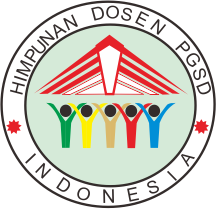HAMBATAN KOMUNIKASI GURU PADA PROSES PEMBELAJARAN PENDIDIKAN JASMANI DI SD NEGERI SE-KECAMATAN KEMBARAN
DOI:
https://doi.org/10.30595/dinamika.v11i1.5982Keywords:
Hambatan komunikasi guru, Pendidikan jasmani, Sekolah DasarAbstract
This study aims to determine the communication barriers of teachers in the physical education learning process in public elementary schools throughout the Kembaran District. This research is a descriptive study using a survey method with the data collection technique in the form of a questionnaire. The population in this study were 26 Physical Education teachers, data collection instruments using a questionnaire, data analysis techniques using descriptive analysis as outlined in the form of a percentage of teacher communication barriers to the physical education learning process in public elementary schools in Kembaran Subdistrict using 5 categories namely categories very good, good, medium, lacking, and very lacking. The results showed that the communication barriers of teachers to the physical education learning process in state elementary schools in the Kembaran sub-district were in the medium category, in detail there were 3 teachers (11.54%) in the excellent category, 3 teachers (11.54%) in the good category, 13 teachers (46.15%) in the medium category, 5 teachers (19.23%) in the poor category, 3 teachers (11.54%) in the very poor category.References
Anna Abdullah dan Agus Manadji. (1994). Dasar-Dasar Pendidikan Jasmani. Yogyakarta: Universitas Negeri Yogyakarta.
Sumadi Surya Brata. (2002). Psikologi pendidikan. Jakarta: PT Raja Grafindo Persada.
Danuri dkk. (1995). Psikologi Pendidikan. Yogyakarta: Universitas Negeri Yogyakarta.
Deddy Mulyana. (2003). Ilmu Komunikasi (Suatu Pengantar). Bandung: Remaja Rosdakarya.
Depdiknas. (2003). Kurikulum 2004 Sekolah Menengah Pertama (SMP) Pedoman Khusus Pengembangan Sistem Penilaian Berbasis Kompetensi SMP Mata Pelajaran Pendidikan Jasmani. Jakarta.
Husaini Usman dan Purnomo Setiady. (1995). Metodologi Penelitian Sosial. Jakarta: Bumi Aksara.
Jalalludin Rakhmat. (2001). Metodologi Penelitian Komunikasi. Bandung: Remaja Rosdakarya.
Jalalludin Rakhmat. (1999). Psikologi Komunikasi. Bandung: Remaja Rosdakarya.
Muhyadi. (1989). Organisasi Teori Struktur dan Proses. Jakarta: Depdikbud.
Onong Uchjana Effendy. (2003). Ilmu Komunikasi (Teori dan Praktek). Bandung. Remaja Rosdakarya.
Pawit. (1990). Komunikasi Pendidikan dan Komunikasi Instruksional. Bandung: Remaja Rosdakarya.
Poerwodarminta. (1984). Kamus Umum Bahasa Indonesia. Jakarta: Balai Pustaka.
Rusli Lutan. (2000). Strategi Belajar Mengajar Penjaskes. Departemen Pendidikan dan Kebudayaan.
Saifudin Azwar. (1992). Reliabilitas dan Validitas. Yogyakarta: Pustaka Pelajar.
Suharsimi Arikunto, (2002). Prosedur Penelitian (Suatu Pendekatan Praktek) Revisi V. Jakarta: Rineka Cipta.
Sukandarrumidi. (2002). Metodologi Penelitian Untuk Pemula. Yogyakarta: Gadjah Mada University Pers.
Mohamad Surya. (2003). Psikologi Pembelajaran dan Pengajaran. Jakarta: Mahaputra Adidaya.
Suharsimi Arikunto. (2002). prosedur penelitian. Edisi Revisi V. Jakarta ; Rineka Cipta.
Suryobroto, Agus S. (2001). Diktat Mata Kuliah Teknologi Pembelajaran
Pendidikan Jasmani. Yogyakarta: Universitas Negeri Yogyakarta.
Wawan Suherman. (2001). Pengembangan Kurikulum Pendidikan Jasmani. (Diktat Mata Kuliah Kajian Kurikulum Penjas). Yogyakarta: Universitas Negeri Yogyakarta.
Downloads
Published
How to Cite
Issue
Section
License
Authors who publish with this journal agree to the following terms:
Authors retain copyright and grant the journal right of first publication with the work simultaneously licensed under a Creative Commons Attribution License that allows others to share the work with an acknowledgement of the work's authorship and initial publication in this journal.
Authors are able to enter into separate, additional contractual arrangements for the non-exclusive distribution of the journal's published version of the work (e.g., post it to an institutional repository or publish it in a book), with an acknowledgement of its initial publication in this journal.
Authors are permitted and encouraged to post their work online (e.g., in institutional repositories or on their website) prior to and during the submission process, as it can lead to productive exchanges, as well as earlier and greater citation of published work (See The Effect of Open Access).

Dinamika Jurnal Ilmiah Pendidikan Dasar is licensed under a Creative Commons Attribution 4.0 International License.













